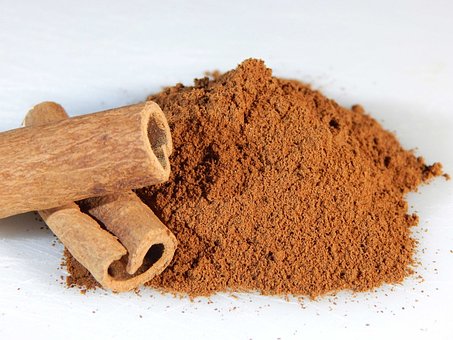Cinnamon is a spice that is commonly used in cooking and baking. It is made from the inner bark of trees that belong to the Cinnamomum family, and is available in two main types: Ceylon cinnamon, also known as “true cinnamon,” and cassia cinnamon, which is more commonly sold in the United States. Both types of cinnamon have similar nutritional properties, but the way they are processed can affect their flavor and the amount of certain compounds they contain.
In terms of nutritional value, a 100-gram (3.5 ounce) serving of cinnamon contains:
Energy: 247 calories
Protein: 4 grams
Fat: 6 grams
Carbohydrates: 86 grams
Fiber: 24 grams
Calcium: 6% of the Recommended Daily Allowance (RDA)
Iron: 41% of the RDA
Vitamin K: 23% of the RDA
Manganese: 354% of the RDA
One of the most notable things about cinnamon is its high manganese content. Manganese is an essential mineral that is involved in many bodily processes, including the metabolism of carbohydrates and the synthesis of proteins and collagen. A 100-gram serving of cinnamon contains more than 10 times the RDA for manganese.
Cinnamon is also a good source of fiber, which can help to keep the digestive system healthy and regulate blood sugar levels. The fiber in cinnamon also helps to slow the absorption of carbohydrates, which may contribute to the spice’s ability to help regulate blood sugar levels.
Cinnamon also contains small amounts of other vitamins and minerals, such as vitamin K and iron. Vitamin K is important for blood clotting, and iron is needed for the production of red blood cells. Additionally, cinnamon contains small amounts of antioxidants, which help to protect the body against damage from free radicals.
As for the health benefits of cinnamon, research suggests that consuming cinnamon may have several health benefits. Some studies have shown that cinnamon can help to lower blood sugar levels in people with type 2 diabetes, and may also help to improve cholesterol levels and reduce the risk of heart disease. Additionally, cinnamon has anti-inflammatory properties, which may help to reduce the risk of certain chronic diseases.
Cinnamon may also have benefits for cognitive function, including improving attention and memory. Some research also suggests that cinnamon may have anti-cancer properties, although more research is needed to confirm these findings.
While cinnamon is considered safe for most people to consume, it is important to note that cinnamon supplements can have side effects. Consuming large amounts of cinnamon supplements can cause low blood sugar, allergic reactions, and other health problems. Therefore, it’s important to talk to your doctor before taking any cinnamon supplements if you have any underlying health conditions or take any medication.
Additionally, the majority of Cinnamon sold in the US is Cassia cinnamon, it contains high amounts of coumarin, which is toxic in high doses. Consuming large amounts of Cassia cinnamon may cause liver damage, therefore it is advisable to use Ceylon cinnamon instead, which is considered safe.
In conclusion, cinnamon is a spice that is rich in nutrients and antioxidants, and consuming it in moderate amounts may have several health benefits. However, it is important to be mindful of the type of cinnamon you consume, and speak with your doctor before taking any cinnamon supplements. Furthermore, including cinnamon in your diet can be a great way to add flavor to your food, while at the same time enjoying the health benefits of this delicious spice.

 Home
Home Health
Health Diet & Nutrition
Diet & Nutrition Living Well
Living Well More
More












